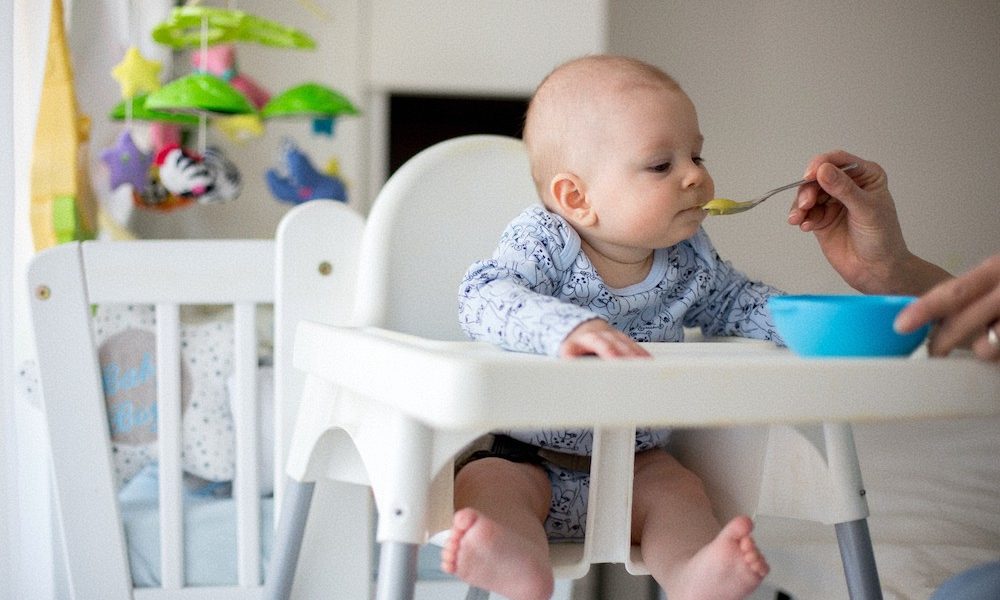How concerned should you be as a parent when it comes to packaged baby food? Here are the facts that you need to know.
BY: CRYSTAL KARGES, MS, RDN, IBCLC
Recent tests by Consumer Reports on popular baby food items detected heavy metals in baby food jars, packaged snacks, pureed pouches and more. These findings are sending parents everywhere into a tailspin.
With more than 90 percent of parents with children 3 and underutilizing packaged baby food products, these findings could be troubling.
Should you be worried about feeding your little one from the simplest jars of baby food?
Before you nix baby food completely from the menu, let’s take a look at the findings and facts:
- Consumer Reports analyzed 50 popular baby and toddler foods, including baby cereals, packaged entrees, packaged fruits and vegetables, and snacks, like puffs, wafers, teething biscuits, cookies, and crackers.
- About two-thirds of the products tested had detectable levels of heavy metals, such as lead, inorganic arsenic, or cadmium.
- Baby and toddler food products containing sweet potatoes and/or rice were more likely to have higher levels of heavy metals.
- Organic foods were just as likely to have heavy metals as their conventional counterparts.
Traces of heavy metals can find their way into packaged food products due to a variety of reasons, including naturally occurring elements found in the soil and environment, farming and manufacturing practices, and pollution, which can all contribute to contamination of crops.
Exposing children, especially babies and toddlers, to heavy metals could cause problematic health issues down the road. So how can you make informed choices on what you’re feeding your child based on findings like these?
When it comes to offering and feeding your child foods that could have potential contaminants, like baby foods with heavy metals, the main issue to be concerned about is chronic and repeated exposure over months and years.
While it would be ideal to prevent any heavy metal ingestion from any food sources, this might not be entirely possible. However, there are several steps you can take to minimize the amount of heavy metals you and your children may be exposed to from food.
1. Opt for casual incorporation of baby/toddler food products when needed.
Packaged and jarred food products, pouch purees, and snack containers can all be convenient for parents, especially when on the go. Rather than relying on these items as the main staple of your child’s diet, aim to incorporate a variety of other fresh, whole foods while trying to use these items sparingly as needed.
2. Aim for variety and serve whole foods when possible.
Serving your child a variety of different, whole foods can prevent overconsumption of heavy metals from manufactured food products. In addition, exposing your child to a variety of whole foods can increase the consumption of nutrients that can counteract exposure to heavy metals, such as vitamin C, Calcium and Zinc.
Even if your baby seems to like 1-2 certain foods, don’t rely on those alone to feed your baby. Variety is also important for preventing picky eating and helping your child learn to eat different foods.
3. Practice baby-led weaning feeding principles as you can.
Baby-led weaning is the practice of transitioning baby to solids by encouraging self-feeding of a variety of whole foods. These practices naturally encourage babies to respond to their innate feeding cues while being exposed to finger foods rather than spoon-fed pureed food. Feeding your baby with the baby-led weaning approach can help minimize exposure to heavy metals found in packaged food products.
4. Take fear out of food.
Most importantly, don’t allow fear to dictate your food choices. Know that whether you decide to spoon-feed pureed food to your baby, go the baby-led weaning route, or a combination of both – you are still a good parent.
Health risks related to potential contaminants in our food sources are more likely to occur with long-term exposure to single food items, which is why variety and balance in our family’s diet are truly important.
When these types of reports and findings come out, it is important to take the facts to make well-informed decisions about your family’s wellness, and leave out any unnecessary fear or confusion that is often created.
Remember that no one food is inherently harmful to us or our babies, and the only “bad” food is food that has been spoiled or rotted. As always, if you have any questions or concerns about how or what you are feeding your baby, be sure to talk with your pediatrician or pediatric registered dietitian.
Adapted from the original article.
HEADER IMAGE: TATYANA TOMSICKOVA
Crystal Karges, MS, RDN, IBCLC is a Registered Dietitian Nutritionist, Board Certified Lactation Consultant, & mama of 5. With a virtual nutrition practice, Crystal helps overwhelmed mamas nurture a peaceful relationship with food & their bodies, end the battles at the dinner table and transform their kitchens to a place of peace & joy. Learn more at Crystal Karges Nutrition.


